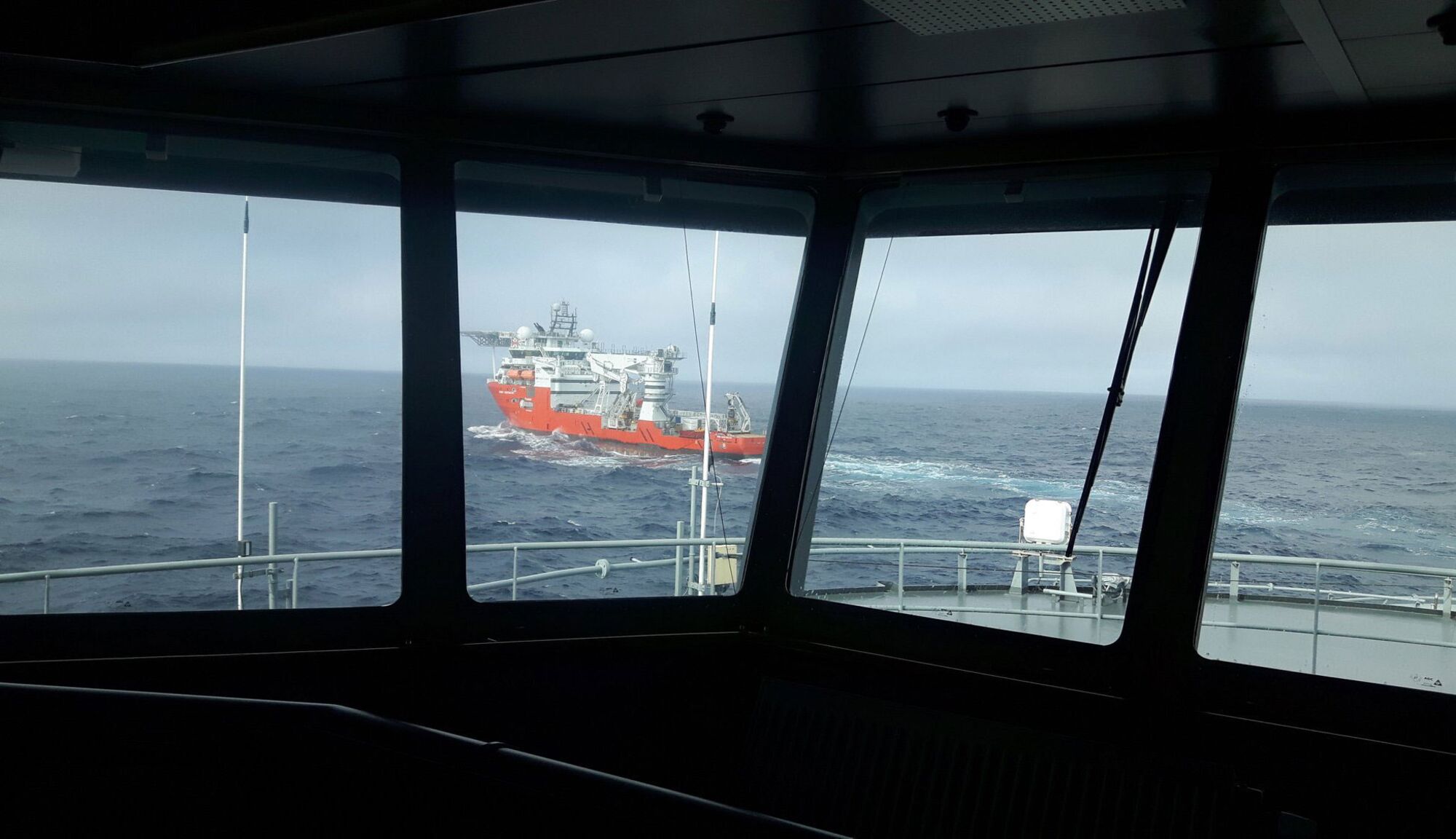A threefer. First up the headliner from Bloomberg Businessweek, November 16:
- It’s said there is more treasure at the bottom of the ocean than in all the world’s museums.
- A new breed of deep-sea prospector has emerged from London and Wall Street, using robots to scour the sea floor.
- Some call them marine disrupters. Others see plunder.
LORD OF THE DEEP
For years a shipwreck hunter has battled governments and rivals over the ocean floor’s riches. He’s kept his identity a secret, until now.
Officers from the Icelandic coast guard watched the ship on the control room monitors—a solitary dot on the blue expanse of the nautical map. The dot had been circling 120 miles offshore for several days in April 2017, in weather no sane sailor would loiter in. Near-gale-force winds howled across mountainous seas; rain mixed with sleet.
By the look of the ship, it wasn’t there to catch fish. Taking on supplies in Reykjavik a few days earlier, the Seabed Constructor’s unusual appearance had attracted local news crews and a visit from a coast guard commodore. Its sleek orange hull supported a space-age communications array and a helipad. A gigantic crane shaped like a scorpion’s tail arched from its stern. Now, as the Constructor bobbed in the storm, the coast guard radioed the vessel’s bridge to ask its business. The response—“research”—was so infuriatingly vague that officers dispatched a helicopter to investigate. The pilot buzzed overhead and reported seeing equipment being winched in and out of the waves.
The Constructor was outside Iceland’s territorial waters but inside its zone of economic influence, just a few miles from an undersea internet cable. Senior coast guard personnel debated what to do, then sent an armed patrol boat to escort the Constructor to port.

The Seabed Constructor, viewed from an Icelandic coast guard vessel.Source: The Icelandic Coast Guard
When the ship got back to Reykjavik, the captain and two operations managers were taken to a police station to be interviewed by Icelandic detectives. All three were cooperative but cagey. They were contractors working for a London client whom they couldn’t, or wouldn’t, identify. They said they’d been hired to search for valuables on the SS Minden, a German cargo ship sunk during World War II that lay broken some 2,240 meters (7,350 feet) below the surface.
The Minden was in Brazil when war broke out in 1939. Historical records don’t show what the vessel was carrying back to Nazi Germany, but they indicate that a handful of German businessmen were on board, including two bankers. Whatever the cargo, it was valuable enough that, when the Minden was spotted by the British navy, the captain scuttled the ship rather than let it fall into enemy hands.
At first the Icelandic coast guard was reluctant to allow the operation to continue, but it relented a couple of weeks on after receiving a letter from the Constructor’s lawyers threatening to sue. To recover whatever the Minden contained, all the salvors needed to do was return with an environmental permit. The application set out a plan to use battery-powered, remotely operated subs to cut open the hull, bend back a sheet of metal and retrieve a wooden box from the mailroom. “Our client expects that the operation will take approximately 24 to 48 hours if weather conditions are favourable,” the document said.
At no point did the Icelandic authorities learn the identity of this mysterious client, the backer of the Minden expedition. They couldn’t have known that the German ship was one of dozens he’s pursued over the years. Media reports about wrecks this man has found or recovered have described him variously as an anonymous London financier, “the unknown salvor” and “the Originator.” He’s marshaled a high-tech operation to recover the lost treasures of history, spanning centuries and entire civilizations and covering most of the blue portion of the planet. And he’s managed to keep this remarkable enterprise secret—until now.
To piece it all together, Bloomberg Businessweek investigated the financier’s operations across 11 months, interviewing more than 40 current and former employees of his companies, as well as contractors, archaeologists, government officials, law enforcement officers and attorneys. Many of them requested anonymity, concerned about possible legal consequences from discussing what the financier considers his private business. The research also drew on corporate and legal filings, government records and satellite ship location data to confirm previously unreported expeditions.
The glitter of deep-sea treasure has lured adventurers since time immemorial, and most have ended up poorer instead of richer. There are about 3 million wrecks in the ocean, an unharvested bounty worth untold billions of dollars, but getting to them can be dangerous, difficult and ruinously expensive. Recently, though, advances in underwater technology have opened up swaths of the ocean floor to exploration. Beyond gems and cultural treasures are rare minerals, oil, gas, battery metals and creatures unknown to science—all outside the reach of any state regulator that might constrain an eager entrepreneur. In the deep-sea gold rush that’s resulted, what matters most is getting there first.
Right now, the only ones with the resources to join in are corporate interests and wealthy individuals whose goals may or may not be aligned with the rest of humanity. The Originator is the most prolific of them all—the most successful shipwreck hunter in modern times, perhaps in all of history. His name is Anthony Clake, and he’s a 43-year-old hedge fund executive who rarely leaves dry land.
Clake’s pursuit can be traced back to another quest popular with the super rich: the hunt for lower taxes. At the turn of the century, enterprising accountants and bankers in the City of London were creating ever more ingenious shelters for their clients’ money—investing in Harry Potter film distribution, say, or arranging for bonuses to be paid in fine wine.
The contribution London investment firm Robert Fraser Asset Management made to the genre was tax-efficient shipwreck hunting. The idea was to mitigate the high risk of losing millions of dollars on a fruitless search by claiming a juicy tax break in the event of failure. To do this, Robert Fraser created companies tailored to individual wreck operations, then used leverage and other accounting tricks to supercharge investors’ tax relief.
A Robert Fraser brochure touting its approach hails a new era of wreck recovery, aided by million-dollar marine robots and side-scan sonar that creates accurate 3D seafloor maps. Among the firm’s first investors were celebrities and tech entrepreneurs, as well as executives at the London hedge fund Marshall Wace. Founded in 1997 by Paul Marshall and Ian Wace, it grew to become one of the top hedge funds in London, then the planet. Today it has $62 billion under management and a reputation for making money in good times and in bad. Both of the founders put money into Robert Fraser’s marine ventures, and so did Clake, a talented young Marshall Wace executive.
The Financial Times reported in a story about the hedge fund that, in 2002, fresh from his studies at the University of Oxford, Clake developed a successful portfolio system that reviewed stock recommendations from 1,000 or so analysts to generate trading ideas. Those who’ve worked with him say his passion lay there—with technology and data. But he took a particular interest in shipwrecks, according to several people interviewed for this article who asked not to be identified, citing nondisclosure agreements. (A Marshall Wace spokesman says the investments were made in a personal capacity, unconnected to the hedge fund’s business.)
By 2015, Robert Fraser had formed a partnership with a leading deep-sea recovery company, Odyssey Marine Exploration Inc. The financial firm’s marine unit had attracted about 100 individual investors, sponsoring expeditions around the world, each with its own code name and off-the-shelf company. One of the most ambitious, the “Enigma” project, sought an historic wreck called the Napried, known to be stuffed with priceless relics when it sank somewhere off the coast of Lebanon in 1872....
....MUCH MORE
And from the BBC, June 19, 2023:
How many shipwrecks are there in the world's oceans?This week UNESCO announced it has found three new shipwrecks, including two that are thousands of years old. But just how many more could be out there?
When Elias Stadiatis descended into the indigo-blue water, he had a normal day of searching for sponges ahead of him. Weighed down in a copper diving suit, surrounded by a tangle of breathing tubes, Stadiatis eventually reached the seafloor. As he squinted into the dim, he took in a haunting scene: all around were the fuzzy outlines of human body parts. As he surfaced in a pool of bubbles, he frantically informed the captain he'd found a heap of rotting corpses.
It was the spring of 1900, and Stadiatis had accidentally discovered the Antikythera shipwreck – the remains of a Roman cargo vessel that had sunk more than two millennia earlier. It soon became clear that it was not teeming with cadavers, as it first seemed, but artworks – marble sculptures and bronze statues, seasoned by thousands of years among algae, sponges and fish.
More than 100 years on, the relics at Antikythera, found off the coast of a Greek island on the edge of the Aegean Sea, are still captivating the public. But there are plenty of submerged wonders still waiting to be discovered....
....MUCH MORE
Also at the BBC, this time from 2021, a really old machine, the Antikythera Mechanism.
A year after Stadiatis and the other divers started bringing stuff up from the seabed an archeologist was looking at a rock that was brought up along with the loot. But the rock had a gear wheal embedded in it.
And apparently the gear was part of an analog computer. That would have looked something like this:

Two thousand years ago.
Here's the story:
Scientists unlock mysteries of world's oldest 'computer'